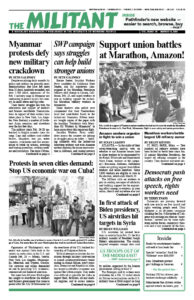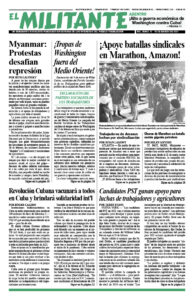Hundreds of protesters took to the streets and occupied government offices in Saravan, a city in southeastern Iran, Feb. 23 in response to the Islamic Revolutionary Guard Corps killing of at least 10 sukhtbars (fuel carriers) and injuring six more the day before.
The sukhtbars eke out a living taking diesel fuel from the Baluchistan region of Iran, one of the most impoverished parts of the country, across the border into Pakistan. The price of fuel in Iran is government subsidized at a price substantially lower than it sells for in Pakistan. The trade is large, estimated to be almost 20% of the diesel fuel supply there.
Sistan and Baluchistan is the second-largest of Iran’s 31 provinces. Its population mainly consists of the Baluchi people, an oppressed nationality in Iran and a Sunni Muslim minority in that country. There are some 5 million in Iran, Pakistan and Afghanistan. At least three-quarters of the Baluch in Iran live under the government’s official poverty line.
“The sukhtbars were stuck in the border area for two days,” the London-based Baloch Campaign reported, “and when they protested at the IRGC base, the guards responded with bullets.” According to a BBC Farsi report, security forces opened fire on those who began to open up the blocked highway at the border to carry the fuel through to Pakistan.
Transporting fuel to Pakistan by sukhtbars is not considered smuggling by the Iranian government. Some crossings were designated for this purpose “to improve the livelihood of people living along the border,” Mohammad Hadi Marashi told the Islamic Republic News Agency in an interview on Feb. 23. However, recently the Islamic Revolutionary Guard Corps began to take over and instituted a family system of operation. A group of five families would receive one fuel ration card if they live within a strip of 20 kilometers (12.4 miles) along the border, and at least one member from any of the families joins the “Tribal Mobilization” corps and agrees to do guard duty at a border crossing near their village.
Iranian rulers fear spread of protests
The protests in Saravan continued for a number of days, the Wall Street Journal reported. The Iranian government, fearing the spread of these actions throughout the province and nationwide, shut down the internet in the region.
Iranian border guards also opened fire on the protesters at a police station in Taftan in northeastern Baluchistan, resulting in one death and several injured, reported Iranian state TV.
For the last few years there have been popular protests across Iran by workers, farmers and youth, demanding action against widespread unemployment, harsh living conditions and the effects of the Iranian rulers’ military assaults abroad.
The tightening of Washington’s economic sanctions over the past few years has deepened the crisis facing working people. The official annual inflation rate is now 46.2%, compared with less than 10% three years ago. The cost of chicken, rice and eggs has almost doubled over the past year, while the prices for beans and vegetable oil have increased by about three times.
The Iranian regime has also tried to intimidate working people through stepped-up use of the death penalty in recent months. At least 21 Baluchi prisoners were executed in Zahedan, Mashhad and Isfahan prisons since mid-December, the U.N. reported.
Molana Abdolhamid, leader of Sunni Friday prayers in Zahedan, the main Baluch city, issued a statement Feb. 23 pointing to high unemployment in Baluchistan and saying that thousands of families earn their living through sukhtbari. He called the shootings “a crime against religion and law” and called on the authorities for the “rapid trial and persecution of its perpetrators.”
The Baluch member of parliament from the city of Chahbahar, in the south of Baluchistan, told the Iran Labor News Agency, “Put yourself in place of those people whose sons went out to earn an honest living, but in return they got their corpses.” He said that those guilty have to be dealt with according to law, “no matter what position they occupy.” Abdolhamid told ILNA that a delegation from the parliament is going to the Saravan region to investigate the events there.

